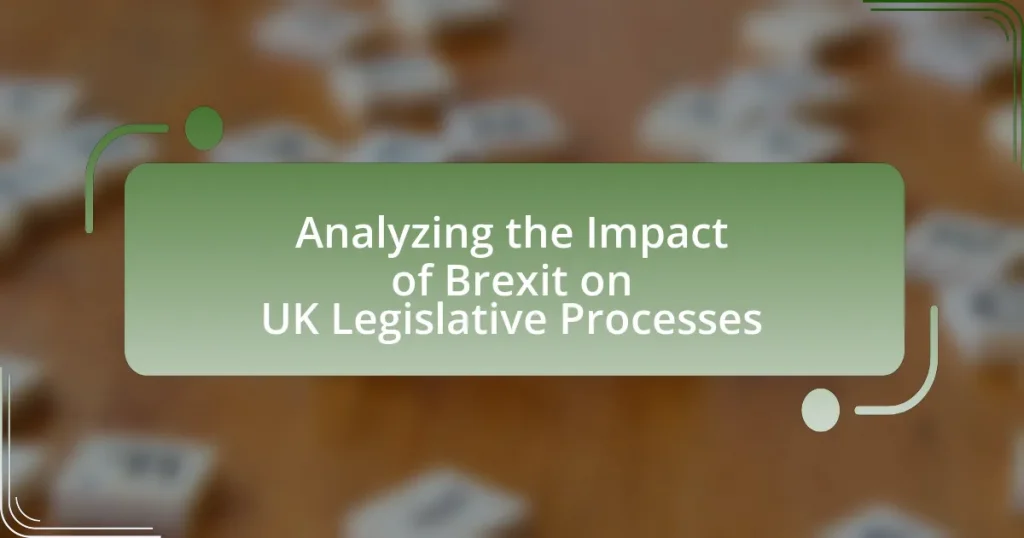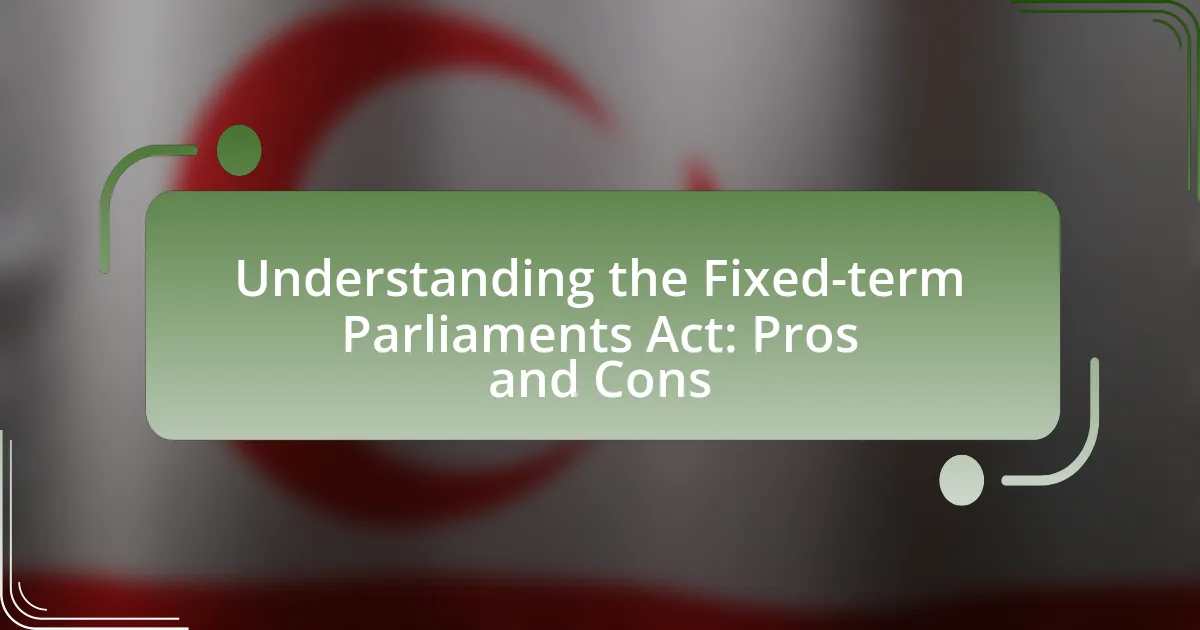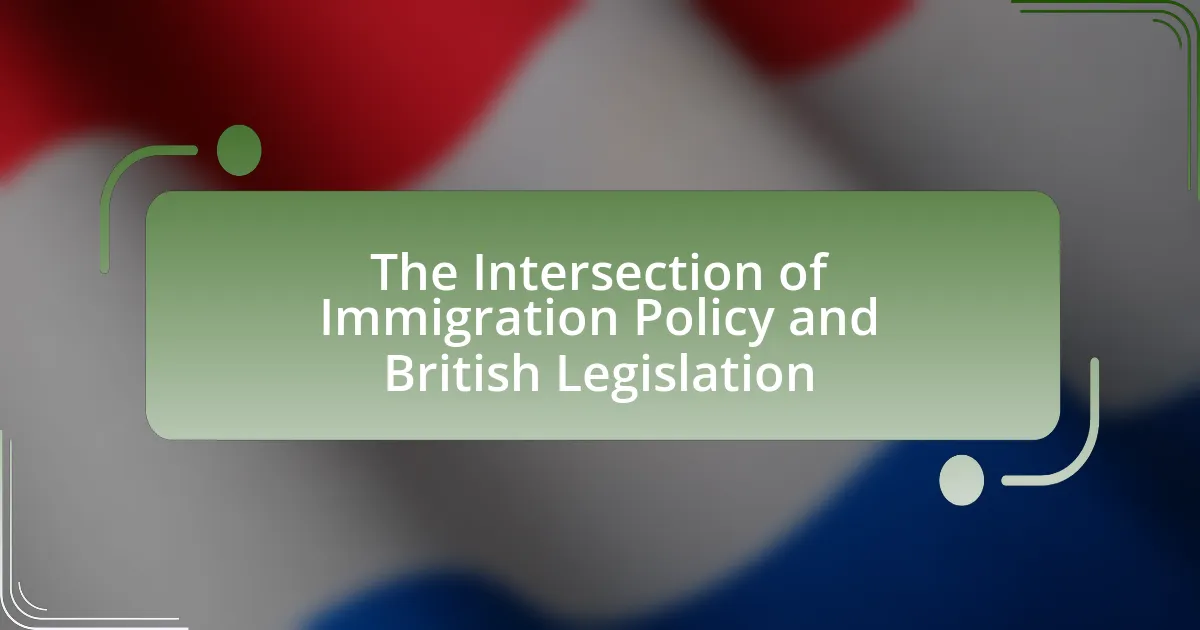The article analyzes the impact of Brexit on UK legislative processes, highlighting the significant changes that have occurred since the UK’s departure from the European Union. It discusses the end of EU law supremacy, the introduction of new legislation such as the European Union (Withdrawal) Act 2018, and the increased authority of the UK Parliament to create laws independently. Key challenges, including the complexities of navigating new regulatory frameworks and the implications for devolved governments, are examined. Additionally, the article addresses how public opinion and interest groups influence legislative decisions in the post-Brexit context, as well as the long-term implications for UK laws and international agreements.
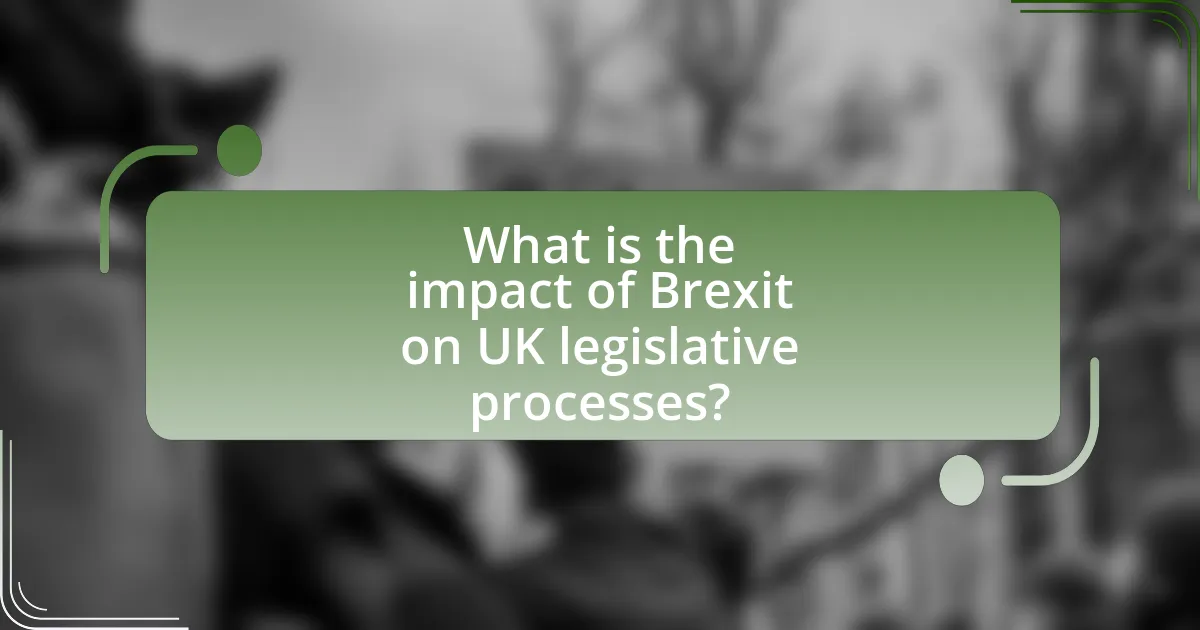
What is the impact of Brexit on UK legislative processes?
Brexit has significantly altered UK legislative processes by ending the supremacy of EU law in the UK. Prior to Brexit, EU regulations and directives had direct effect in the UK, meaning that UK legislation had to align with EU laws. Post-Brexit, the UK Parliament regained full sovereignty to create and amend laws without EU constraints, allowing for tailored legislation that reflects national priorities. This shift is evidenced by the European Union (Withdrawal) Act 2018, which repealed the European Communities Act 1972, thus removing the legal basis for EU law’s supremacy in the UK. Consequently, the legislative landscape has become more complex, as the UK must now navigate the creation of new laws that address areas previously governed by EU legislation, such as trade, immigration, and environmental standards.
How has Brexit changed the legislative landscape in the UK?
Brexit has fundamentally altered the legislative landscape in the UK by transferring powers from the European Union back to the UK Parliament, thereby enabling the UK to create its own laws without EU constraints. This shift has led to the introduction of new legislation, such as the European Union (Withdrawal) Act 2018, which repealed the European Communities Act 1972 and established the framework for the UK’s departure from the EU. Additionally, the UK has gained the authority to diverge from EU regulations, allowing for the development of domestic policies in areas like trade, agriculture, and environmental standards, which were previously governed by EU law. This legislative independence has sparked debates over regulatory alignment and the potential for a “race to the bottom” in standards, reflecting the significant impact of Brexit on the UK’s law-making processes.
What are the key legislative changes resulting from Brexit?
The key legislative changes resulting from Brexit include the repeal of the European Communities Act 1972, which ended the supremacy of EU law in the UK, and the introduction of the European Union (Withdrawal) Act 2018, which provided the legal framework for the UK’s exit from the EU. Additionally, the UK has implemented new trade agreements, such as the Trade and Cooperation Agreement with the EU, which governs future relations. These changes have led to the establishment of new regulatory frameworks in areas like immigration, agriculture, and fisheries, reflecting the UK’s shift towards independent policy-making.
How has the role of Parliament evolved post-Brexit?
The role of Parliament has evolved post-Brexit by gaining increased authority over domestic legislation and regulatory frameworks previously governed by EU law. Following the UK’s departure from the EU, Parliament has had to navigate the complexities of repatriating powers, which has led to a greater emphasis on scrutinizing and amending legislation that directly impacts the UK’s legal and economic landscape. For instance, the European Union (Withdrawal) Act 2018 enabled Parliament to review and adapt existing EU laws, thereby enhancing its legislative responsibilities. This shift has resulted in Parliament playing a more central role in shaping policies related to trade, immigration, and environmental standards, reflecting the need for greater accountability and representation in the absence of EU oversight.
What challenges has Brexit posed to UK legislation?
Brexit has posed significant challenges to UK legislation, primarily by creating a complex legal landscape that requires the UK to establish new laws and regulations previously governed by EU legislation. The transition from EU law to domestic law has led to uncertainties regarding the continuity of legal frameworks, as approximately 20,000 pieces of EU legislation needed to be reviewed and potentially amended or replaced. This process has strained parliamentary resources and raised concerns about the adequacy of scrutiny for new laws, as the UK Parliament must now navigate the intricacies of both inherited EU laws and new domestic legislation. Additionally, the divergence from EU standards may lead to regulatory inconsistencies, complicating trade relationships and legal compliance for businesses operating in both the UK and EU markets.
How has Brexit affected the relationship between UK and EU laws?
Brexit has fundamentally altered the relationship between UK and EU laws by ending the supremacy of EU law in the UK. Prior to Brexit, EU law had direct effect in the UK, meaning that EU regulations and directives were automatically applicable. Post-Brexit, the UK Parliament regained full sovereignty, allowing it to create and amend laws independently of EU regulations. This shift is evidenced by the European Union (Withdrawal) Act 2018, which repealed the European Communities Act 1972, thereby removing the legal basis for EU law’s supremacy in the UK. Consequently, the UK can now diverge from EU legislation, leading to potential regulatory differences in areas such as trade, environmental standards, and labor laws.
What are the implications for devolved governments in the UK?
The implications for devolved governments in the UK following Brexit include increased tensions over legislative powers and resource allocation. Devolved governments, such as those in Scotland, Wales, and Northern Ireland, may face challenges in areas previously governed by EU law, as the UK Parliament retains the ability to legislate in these areas, potentially undermining devolved authority. For instance, the Internal Market Act 2020 allows the UK government to set regulations that could conflict with devolved policies, leading to disputes over jurisdiction and governance. Additionally, the loss of EU funding programs has created financial uncertainties for devolved administrations, impacting their ability to deliver public services and implement regional policies effectively.

How does Brexit influence the legislative process in practice?
Brexit significantly influences the legislative process in the UK by altering the relationship between UK law and EU law. Following Brexit, the UK Parliament regained full sovereignty, allowing it to create and amend laws without EU constraints. This shift has led to the introduction of new legislation, such as the European Union (Withdrawal) Act 2018, which facilitated the repeal of the European Communities Act 1972 and provided a framework for converting existing EU law into UK law. Additionally, the legislative process has become more complex, as lawmakers must now navigate the implications of diverging from EU regulations, which can affect trade, environmental standards, and workers’ rights. The necessity for new laws to replace or modify EU-derived legislation has increased the volume of parliamentary activity, impacting the speed and focus of the legislative agenda.
What are the procedural changes in Parliament due to Brexit?
The procedural changes in Parliament due to Brexit include the repeal of the European Communities Act 1972, which ended the supremacy of EU law in the UK. This change necessitated the introduction of new legislation to replace EU regulations and frameworks, such as the European Union (Withdrawal) Act 2018, which provided for the transposition of existing EU law into UK law. Additionally, Parliament now has to scrutinize and approve new trade agreements independently, as the UK is no longer bound by EU treaties. The legislative process has also seen an increase in the use of statutory instruments to implement changes quickly, reflecting the need for agility in adapting to new regulatory frameworks post-Brexit.
How have debates and discussions shifted in Parliament?
Debates and discussions in Parliament have shifted significantly since Brexit, primarily characterized by increased polarization and a focus on national sovereignty. Following the 2016 referendum, the nature of parliamentary discourse has evolved to reflect heightened tensions between pro-Brexit and anti-Brexit factions, leading to more contentious exchanges. For instance, the debates surrounding the European Union (Withdrawal) Act 2018 showcased this shift, as MPs engaged in prolonged discussions over the implications of leaving the EU, often resulting in divisions along party lines. Additionally, the urgency of addressing Brexit-related legislation has compressed timelines for debate, limiting the scope for thorough scrutiny and fostering a more reactive legislative environment. This transformation underscores the profound impact of Brexit on the dynamics of parliamentary discussions, as evidenced by the increased frequency of emergency debates and the prioritization of Brexit-related issues over other legislative matters.
What new committees or processes have been established?
New committees and processes established in the UK legislative framework post-Brexit include the Joint Committee on the National Health Service (NHS) and the Trade Bill Committee. The Joint Committee on the NHS was formed to address health-related legislative changes resulting from Brexit, ensuring that health services adapt to new regulations. The Trade Bill Committee was created to scrutinize trade agreements and their implications for UK businesses and consumers, reflecting the need for oversight in a newly independent trade environment. These committees are part of a broader effort to adapt legislative processes to the changes brought about by the UK’s departure from the EU.
How are stakeholders responding to legislative changes post-Brexit?
Stakeholders are responding to legislative changes post-Brexit with a mix of adaptation and concern. Businesses, particularly in sectors like finance and agriculture, are adjusting their operations to comply with new regulations, while expressing worries about increased trade barriers and regulatory divergence from the EU. For instance, the UK’s financial services sector has raised alarms over losing passporting rights, which previously allowed seamless access to EU markets. Additionally, trade associations, such as the British Chambers of Commerce, have reported that many companies are struggling with new customs procedures, leading to delays and increased costs. This response highlights the significant impact of legislative changes on operational strategies and market access for various stakeholders.
What role do interest groups play in shaping post-Brexit legislation?
Interest groups significantly influence post-Brexit legislation by advocating for specific policies and interests that align with their agendas. These groups, including trade associations, environmental organizations, and labor unions, engage in lobbying efforts to shape the legislative framework that governs the UK’s new relationship with the EU and other global partners. For instance, the Confederation of British Industry (CBI) has actively lobbied for favorable trade agreements and regulatory frameworks to support businesses affected by Brexit. Their efforts are supported by data indicating that businesses seek clarity and stability in regulations to maintain competitiveness, highlighting the importance of interest groups in representing economic interests during the legislative process.
How are public opinions influencing legislative decisions?
Public opinions significantly influence legislative decisions by shaping the priorities and actions of lawmakers. During the Brexit process, for instance, public sentiment regarding leaving the European Union prompted MPs to consider constituents’ views more closely, leading to debates and amendments that reflected popular concerns. Research conducted by the Institute for Government in 2019 highlighted that MPs were more likely to engage with their constituents and adjust their stances based on public feedback, particularly in response to high-profile issues like Brexit. This demonstrates that public opinion can directly affect legislative outcomes by compelling representatives to align their decisions with the electorate’s preferences.
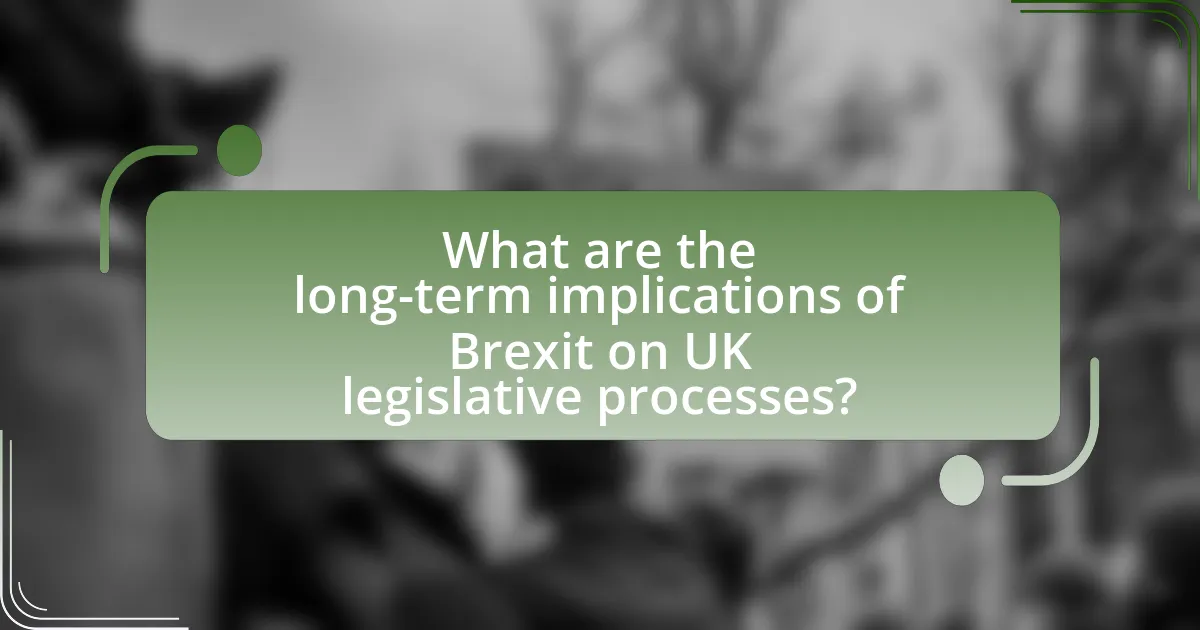
What are the long-term implications of Brexit on UK legislative processes?
The long-term implications of Brexit on UK legislative processes include increased legislative autonomy and potential regulatory divergence from the European Union. Following Brexit, the UK Parliament gained the ability to create and amend laws without EU oversight, allowing for tailored legislation that reflects domestic priorities. However, this autonomy may lead to regulatory divergence, as the UK could adopt different standards and regulations compared to EU member states, impacting trade relationships and compliance for businesses operating across borders. The Trade and Cooperation Agreement established a framework for future relations, but ongoing negotiations and adaptations will shape the legislative landscape, influencing areas such as environmental policy, labor laws, and trade regulations.
How might Brexit reshape future UK legislation?
Brexit may reshape future UK legislation by allowing the UK Parliament to regain sovereignty over its laws, enabling the creation of regulations that are tailored specifically to the UK context. This shift means that the UK can diverge from EU regulations, potentially leading to the introduction of new laws in areas such as trade, immigration, and environmental standards. For instance, the UK has already begun to amend its agricultural policies to better suit domestic needs, moving away from the Common Agricultural Policy that was previously dictated by the EU. This legislative flexibility could foster innovation and responsiveness to local issues, as seen in the UK’s ability to implement its own data protection laws, distinct from the EU’s General Data Protection Regulation.
What trends are emerging in legislative priorities post-Brexit?
Post-Brexit, emerging trends in legislative priorities for the UK include a focus on trade agreements, regulatory autonomy, and immigration control. The UK government has prioritized establishing new trade deals outside the EU framework, as evidenced by agreements with countries like Australia and Japan, which aim to enhance economic growth and market access. Additionally, there is a significant emphasis on regulatory independence, allowing the UK to diverge from EU standards in areas such as environmental policy and labor laws, reflecting a desire for tailored domestic regulations. Immigration policy has also shifted, with the introduction of a points-based system designed to control the influx of workers and prioritize skilled labor, aligning with the government’s broader goals of sovereignty and economic self-determination. These legislative trends indicate a strategic pivot towards enhancing national interests in a post-EU context.
How could Brexit affect the UK’s international agreements and treaties?
Brexit could significantly alter the UK’s international agreements and treaties by necessitating the renegotiation of existing arrangements previously established through EU membership. The UK, having left the EU, is no longer bound by EU treaties, which means it must independently establish its own trade agreements and diplomatic relations. For instance, the UK has sought to replace EU trade agreements with bilateral deals, such as the UK-Japan Comprehensive Economic Partnership Agreement, which was signed in October 2020. This shift indicates a move towards a more autonomous foreign policy, but it also presents challenges in maintaining the same level of access to markets and cooperation that were facilitated by EU membership.
What best practices can be adopted for effective legislative adaptation post-Brexit?
Effective legislative adaptation post-Brexit can be achieved by adopting a collaborative approach that involves stakeholder engagement, continuous review of legislation, and alignment with international standards. Engaging stakeholders, including businesses, civil society, and legal experts, ensures that diverse perspectives are considered, leading to more comprehensive and effective laws. Continuous review of existing legislation allows for timely updates and adjustments in response to changing circumstances, which is crucial given the dynamic nature of post-Brexit relations. Additionally, aligning new laws with international standards facilitates trade and cooperation, as evidenced by the UK’s efforts to maintain regulatory alignment with the EU in key sectors. These practices collectively enhance the adaptability and effectiveness of the legislative process in the post-Brexit context.
How can Parliament ensure transparency and public engagement in the new legislative environment?
Parliament can ensure transparency and public engagement in the new legislative environment by implementing digital platforms for real-time access to legislative proceedings and encouraging public consultations. Digital platforms, such as live streaming sessions and online portals for submitting feedback, allow citizens to observe and participate in the legislative process. For instance, the UK Parliament’s website provides access to debates, committee meetings, and documents, fostering greater public awareness and involvement. Additionally, regular public consultations on proposed legislation can enhance engagement, as seen in the recent use of surveys and forums to gather citizen input on Brexit-related policies. These measures collectively promote accountability and inclusivity in the legislative process.
What strategies can be implemented to navigate the complexities of post-Brexit legislation?
To navigate the complexities of post-Brexit legislation, organizations should implement comprehensive legal assessments, engage in continuous stakeholder consultations, and invest in training for compliance teams. Comprehensive legal assessments allow organizations to understand the nuances of new regulations, as the UK has adopted various laws that diverge from EU standards, such as the UK Internal Market Act 2020. Continuous stakeholder consultations ensure that businesses remain informed about legislative changes and can adapt their strategies accordingly, as seen in the frequent updates provided by the UK government on trade agreements. Investing in training for compliance teams equips them with the necessary skills to interpret and apply new laws effectively, which is crucial given the rapid changes in the legislative landscape following Brexit.
